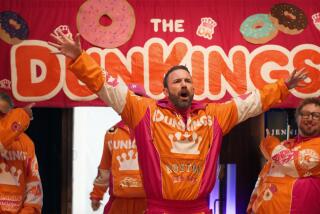Faking New Year: Countdown to a Controversy : Television: CBS and ABC will have recorded segments in their Dec. 31 specials.
FT. WORTH, Tex. â âTen! Nine! Eight!â roared the stetson- and sequin-bedecked crowd.
Pop! Pop! Pop! boomed the bubbly bottles.
âItâs going to be a great 1990!â shrieked country music star Tanya Tucker. âHappy new year!â
It may have been Dec. 5 to the rest of the world, but it was New Yearâs Eve at Billy Bobâs bar in Ft. Worth, home to the worldâs only indoor rodeo ring and two mechanical bucking stuffed dead bulls.
And when the nation sees Billy Bobâs on CBS Dec. 31, the only indication that Tucker was actually a little early when she told the cameras, âLetâs go live to the Waldorf-Astoria in New York,â will be a small disclaimer reading, âportions of the telecast were recorded.â
âYou mean weâre faking New Yearâs?â asked a network executive who declined comment for this story.
Well, yes.
Both CBS and ABC, the only networks planning to run New Yearâs Eve specials this year, will show the New York portion of their celebrations live. After all, thereâs only one Times Square and only one humongous crowd to watch a lighted ball drop in the freezing cold.
But when the time comes to show how the rest of America is celebrating, the rest of America will be on tape.
âWhat we do is what we call a âfake new year,â â said Mike Gargiulo, who produces the CBS special. âWe pretend itâs New Yearâs Eve. At the appropriate hour, we do a countdown and we celebrate.â
Gargiulo said that the network has been âfakingâ New Yearâs Eve for 11 years. Parties have been staged at Billy Bobâs, Disney World and the Hollywood Palace. On the Chinese New Year, the entire show is run again in Shanghai, Taiwan and Hong Kong.
At ABC, which has presented âDick Clarkâs New Yearâs Rockinâ Eveâ for 18 years, the only live segments are those showing Clark in Times Square. The party and entertainment sections are all on tape, recorded this year in November at the Cocoanut Grove.
âI canât believe it; I donât believe theyâre doing that,â former CBS News President Fred Friendly said when a reporter told him about the practice.
Staging New Yearâs Eve, Friendly said, is no different than the controversial new practice of staging or re-enacting news events. âItâs as if some infectious disease is taking over, which will destroy the publicâs faith in TV news,â he said.
âThe one thing television has is credibility,â Friendly said. âThatâs the only thing we have. It doesnât matter if itâs New Yearâs Eve or the Berlin Wall--you have to be able to believe it.â
The networks say thereâs no comparison between staging the countdown to New Yearâs Eve and re-enacting news events. Re-enactments have come under fire in recent months because critics claim they are misleading. One study of viewer response to re-enactments showed that people tend to retain the information in the segments but forget that it was staged.
âWeâre not doing this to mislead people,â said producer Gargiulo. âWeâve been doing this for a lot longer than re-enactments have been an issue.â
A key difference between the Dec. 31 show and the re-enactments is that the New Yearâs Eve program is meant to be entertainment, not news, according to CBS. Shows such as CBSâ âSaturday Night With Connie Chungâ and NBCâs âYesterday, Today & Tomorrow,â which feature re-enactments of news events, have been criticized because they are produced by the networkâs news divisions (though NBC News said recently that it was bowing out of âYesterday, Today & Tomorrowâ). The New Yearâs Eve programs, on the other hand, are being produced through the CBS and ABC entertainment divisions.
âThis is not one of those documentary re-enactment shows,â ABC spokeswoman Judy Raskin said. âThis is entertainment.â
But Larry Grossman, former president of NBC News and a fellow at Columbia Universityâs Gannett Center for Media Studies, said that doesnât matter.
âItâs stunning to me that itâs been going on for so many years,â Grossman said when contacted by a reporter. âI think itâs reprehensible. Itâs shocking.â
Grossman said that the average person would never know whether a program was produced by an entertainment division or a news division. Any instance in which television uses its technological capabilities to mislead people, even if itâs just about when a party took place, is wrong, he said.
Mark Berlin, an attorney with the Federal Communications Commission in Washington, said that the agency has specific rules governing programs that are made to appear live.
The regulation reads: âAny taped, filmed or recorded program material in which time is of special significance or by which an affirmative attempt is made to create the impression that it is occuring simultaneously with the broadcast, shall be announced at the beginning as taped, filmed or recorded. The language of the announcement shall be clear and in terms commonly understood by the public.â
The networks said that they offer disclaimers in compliance with the FCC rule.
More to Read
The complete guide to home viewing
Get Screen Gab for everything about the TV shows and streaming movies everyoneâs talking about.
You may occasionally receive promotional content from the Los Angeles Times.






